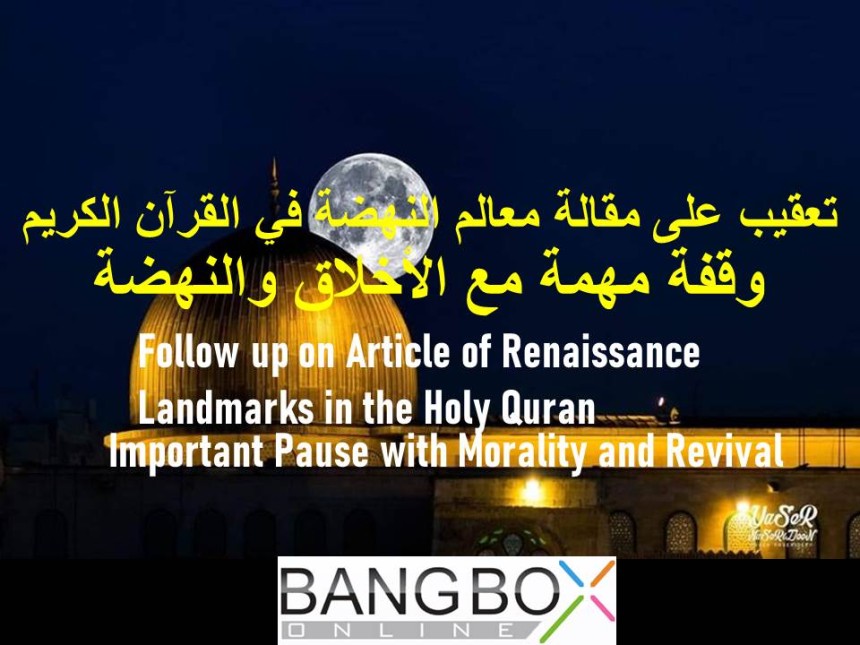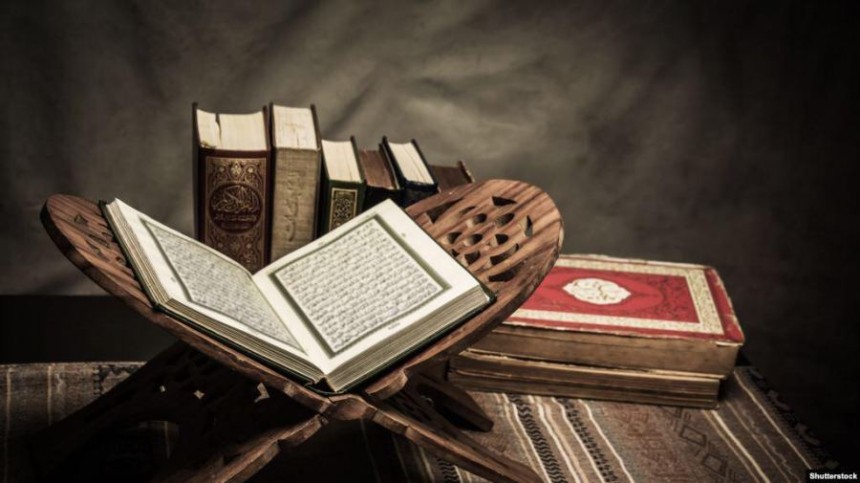
تعقيب على مقالة معالم النهضة في القرآن الكريم; وقفة مهمة مع الأخلاق والنهضة : Follow up on the article of Renaissance landmarks in the Holy Quran; Important pause with morality and revival
Al Quran is the final Holy Book revealed upon the Last of Prophets Hazrat Muhammad (PBUH). The Quran & Sunnah is the only source of holy guidance as it entails detailed instructions for each and every walk of human life. Here guidance from Quran & Sunnah for the followers of Islam (تعقيب على مقالة معالم النهضة في القرآن الكريم; وقفة مهمة مع الأخلاق والنهضة : Follow up on the article of Renaissance landmarks in the Holy Quran; Important pause with morality and revival) is discussed for better living from Quran and Hadith of Prophet ﷺ. This is an English translation of an Arabic article written by Dr Ehsan Samara on FB.
In the name of ALLAH, the Most Gracious, the Most Merciful
The article has a valuable use and deserves appreciation, especially in what it comes from saying that a person rises with his idea composed of his concepts and values, and does not rise with his morals only, this statement does not cancel morality, nor does it cancel its role, position and impact in dealing and life as some people delusional... However, the article must be complemented and clarified the statement by saying that morality is not an inherent value in the Islamic perception, but it is one of the requirements of linking morality and the sincerity of faith, between it and the safety of loyalty to Allah and His Messenger, and good adherence to lawful costs, since Allah Almighty has enjoined the whole of Islam Without partition or separation, to His Glory be to Allah: (O you who have believed, enter into peace sufficiently, and do not follow the footsteps of Satan, for he is a clear enemy) Al-Baqara: (208) Thus alone, the religion of truth becomes a dye for man in all his behaviors, deeds and life activities, and from here morality in the Islamic perception is intervened in all legitimate costs, and not a separate and self-listed value system, in its worships its morality, in its treatment, in relationships its morality, and in its morality of ruling and authority, and in its moral of authority and character.
The character has its morals, and in marital relationships their morals, and the private and the shippers have their morals. Therefore, Allah has said from the whole Qur'an that it is a created system, in His saying: (Praise be to Allah, who has sent down to His servant the Book and has not made for him a stern criterion, so that he may warn of his religion of great affliction; and He gives good tidings to the believers who do righteous deeds that they will have a good reward... ) Cave: (1-2), From here the Holy Qur’an can be practically embodied in the Sunnah of the Prophets in individuals where the Prophet صلى الله عليه وسلم was baptized with the building of elite Islamic characters in Mecca, and in Medina, where he established renaissance landmarks, the building of the Islamic society, the building of Ummah of Islam, and the building of the first Islamic state, in which the peace and blessings of Allah be upon him ruled Peace be upon him with what Allah Almighty sees, and he did all that to make the word of Allah supreme and the word of those who disbelieved lowerly, socially and at the nation level and in the state and international relations.
Therefore, peace and blessings of Allah be upon him, the signs of the renaissance in Islam, and on the basis of this it is not correct to say: "The renaissance is in the Holy Qur'an"; because renaissance is a manifestation of a lifestyle and a way of living that can only exist in community performance, among the general human life activities that stop performing on executive power. The implementation of the laws, relationships and systems that direct collective human activities are directed by a single purpose in a single format, in which everyone appears as one person, regardless of their beliefs, ethnicities, inclinations, interests, stability or perversion.
Based on this, the renaissance is not advisable to talk about it in the individual circle, but in the way of living in life, therefore it is not said that individuals rise, but the whole man rise, and the renaissance of the whole man will have its effects and reflections on the members of the renaissance nation, and therefore, the righteousness and stability of individuals do not affect the renaeration of nations, but On the contrary, the uprising of nations affects the unity of their peoples and individuals.
Therefore, the verses in the entire article are not about the Renaissance from near or far, but about building the Islamic character, and building the Islamic character which is undoubtedly the basis of a chief in legal costs, and therefore the punishment on the Day of Resurrection will fall on individuals, not on the group as a whole... Maryam: (95); and his saying: (Every soul with what it has earned) Al-Mudathir: (38). Character building, even if it is important in Islam, even if it has an important role in the progressive collective work, being the individual who will take care of doing all the costs, he is the one who carries the call, who has the responsibility of jihad and the responsibility of establishing states, and through which industrial, social, and all individual activities are carried out And life, which is the one who practices his relationship with the Creator, Glory be to Him, in himself and with others, except that it is not all to do with the renaissance, the renaissance landmarks are all related to the performance of the audience and the collective mass costs, which in their nature do not empower individuals to accomplish and actually realize them, and those collective mass activities have their legitimate rules, legitimate rules, results and effects, although Individuals are the ones who have the responsibility to do it; but it is not their individual character that has its own capacities, rules, results and effects, but in the context of a systematic collective, according to regular relations in a societal cohesion.
From here we find those vital activities practiced by individuals from different communities to another, following the existing system and productive relations in the society, that is, according to the identity of the society, state and its political system, and from here the assumptions in Islam came from which is an obligation of eye, which is not beyond the building of character, and its nature is not Its realization does not depend on a collective effort, but the individual can achieve it alone, such as prayer, fasting, Hajj, Zakat, righteousness of parents, good character, and so on. There are some assumptions that can only be realized by the efforts and energies in an integrated collective work to achieve them, which are known as sufficient assumptions, and those where the renaissance landmarks fall, such as the establishment of countries. Building the society, liberating the country from foreigners, providing the necessary needs from industries and collective services, caring for the affairs of the people as a whole, which actually stops the efforts and energies to achieve it, so Allah Almighty said: (... And help in righteousness and piety, and do not help in sin and enmity, and fear Allah. Indeed, Allah is severe in retribution) Table: (2)
This confirms that the majority of the divine discourse in the Holy Qur'an in relation to the affairs of the society is directed to the congregation in the form of the collective and not the individual, and the Prophet peace be upon him resembles believers in one body and makes individuals as members of the body, and also the society resembles the participants of a ship... , And the hand of God is with the congregation, and from the principles of Islam and the knowledge in it of religion is necessary, that the individual's status is different from those of society, the nation, the state and international relations, and based on all of this, the revival is not individual, but is a societal appearance that reflects the lifestyle of individuals and their behavior patterns, Rising nations differ in the behavior and actions of their children About backward descended nations, just as a healthy body reflects its well-being on all its organs, and a sick body reflects its disease on all its organs...
And when it is said that nations do not rise with morality, it is a true saying and it is the truth, but nations rise with the relationships and systems that arise from their beliefs and philosophy about life, this saying does not mean to disrespect the value of morality, nor to diminish its importance to humans, but rather to state that it is not a factor of factors of revival; because it is one of the pillars of character On the individual level, the renaissance organizations are collective, and the community organizations have relations, high values, and, above all, a general community, and that is a spiritual fact that can only be denied by the oppressors, Muslims, however, are the most noble people of nations, if they measure other nations of bad character, however, Muslims are in So much backwardness and degradation, other nations and their peoples are on the same level of corruption and perversion emerging from creation, so there was a diminished material uprising in which corruption appeared on land and sea, and ploughing with it destroyed human life in misery, desolate and threatened by the yard...
We ask Allah for everyone to succeed in calling upon Allah for insight, and good foundation for the Prophet صلى الله عليه وسلم, and to inspire everyone to be guided and supported in speech, action and intention, and to guide us to the good destination in working hard and sincerity to polarize the nation towards what Allah has assigned humanity to establish all religion to Allah Almighty, to establish civilization A correct divinity based on intellectual elevation based on my soul -i.e. According to the rules of Allah's Law and its method - Response to the saying of Allah, Glory be to Allah: (Say, I have guided my Lord to a straight path, a righteous religion, an honorable religion, from the nation of Abraham, Hanifa, and who was of the polytheists. Say, "My prayer, my sacrifice, my life, and my death are for Allah, Lord of the worlds, and I have no partner with Him, and I have commanded you, and I am the first of all. Muslims) Anam: (161-163); And His saying: (Do not follow those who have wronged their own desires without knowledge, so whoever guides from the wrong path of Allah and what is not given to them from the righteous path. So set your face to the religion of Hanifa, which is the fate of Allah, which people have chosen for it, no change for Allah's creation. That is the true religion, but most of the people do not know the prophets of Allah, and fear Him. And establish prayer, and be absent. Of the participants) Rom: (29-31)
DR. Ehsan Samara

بسم الله الرحمن الرحيم
تعقيب على مقالة معالم النهضة في القرآن الكريم; وقفة مهمة مع الأخلاق والنهضة
المقالة فيها فائدة قيمة وتستحق التقدير، خاصة فيما جاء فيها من القول بأن الإنسان ينهض بفكره المكون لمفاهيمه وقيمه، ولا ينهض بأخلاقه فقط، فإن هذا القول لا يلغي الأخلاق، ولا يلغي دورها ومكانتها وأثرها في التعامل والحياة كما يتوهم البعض...، ومع ذلك فإن المقالة لا بد من استكمالها وتوضيح المقولة الآنفة بالقول أن الأخلاق ليست قيمة قائمة بذاتها في التصور الإسلامي، وإنما هي من مقتضيات الربط بين الأخلاق وصدق الإيمان، وبينها وبين سلامة الولاء لله ورسوله، وحسن الالتزام بالتكاليف الشرعية، حيث إن الله تعالى كلف بالدخول في الإسلام كله من غير تجزئة ولا تفريق، لقوله سبحانه: (يَا أَيُّهَا الَّذِينَ آَمَنُوا ادْخُلُوا فِي السِّلْمِ كَافَّةً وَلَا تَتَّبِعُوا خُطُوَاتِ الشَّيْطَانِ إِنَّهُ لَكُمْ عَدُوٌّ مُبِينٌ) البقرة: (٢٠٨). وبذلك وحده يصبح التدين الحق صبغة للإنسان في جميع تصرفاته وأفعاله وأنشطته الحياتية، ومن هنا كانت الأخلاق في التصور الإسلامي متداخلة في التكاليف الشرعية كلها، وليست منظومة قِيَمِيَّة منفصلة وقائمة بذاتها، ففي العبادات أخلاقها وفي المعاملات أخلاقها، وفي العلاقات أخلاقها، وفي الحكم والسلطان أخلاقياته، وفي القضاء أخلاقياته، وفي الهيئة والسمت الشخصي أخلاقها، وفي العلاقات الزوجية أخلاقياتها، وفي المخاصمة والشحناء أخلاقها، ولذلك قال سبحانه عن القرآن كله بأنه منظومة خلقية، في قوله سبحانه: (الْحَمْدُ لِلَّهِ الَّذِي أَنْزَلَ عَلَى عَبْدِهِ الْكِتَابَ وَلَمْ يَجْعَلْ لَهُ عِوَجًا قَيِّمًا لِيُنْذِرَ بَأْسًا شَدِيدًا مِنْ لَدُنْهُ وَيُبَشِّرَ الْمُؤْمِنِينَ الَّذِينَ يَعْمَلُونَ الصَّالِحَاتِ أَنَّ لَهُمْ أَجْرًا حَسَنًا...) الكهف: (١-٢)، ومن هنا فقد تجسد القرءان الكريم عمليا بالسنة النبوية في الأفراد حيث عمد النبي صلى الله عليه وسلم ببناء الشخصيات الإسلامية الراقية في مكة المكرمة، وفي المدينة المنورة حيث أرسى معالم نهضة، ببناء المجتمع الإسلامي وبناء أمة الإسلام، وبناء الدولة الإسلامية الأولى، التي حكم فيها صلى الله عليه وسلم بما أراه الله تعالى، وعمل بذلك كله على جعل كلمة الله هي العليا وكلمة الذين كفروا السفلى، مجتمعيا وعلى مستوى الأمة وفي الدولة والعلاقات الدولية. فبين صلى الله عليه وسلم بذلك معالم النهضة في الإسلام، وبناء على ذلك لا يصح القول: "معالم النهضة في القرآن الكريم"؛ لأن النهضة مظهر لنمط من الحياة وطراز من العيش لا يمكن وجودها إلا في الأداء المجتمعي، ضمن عموم الأنشطة البشرية الحياتية التي تتوقف في أدائها على سلطة تنفيذية تتولى تنفيذ القوانين والعلاقات والنظم التي توجه الأنشاطة البشرية الجمعية توجيها هادفاً موحدا في نسق واحد، يظهر به الجميع وكأنهم شخص واحد، على اختلاف معتقداتهم وأعراقهم وميولهم واهتماماتهم واستقامتهم أو انحرافهم.
وبناء على ذلك فالنهضة لا يصح الحديث عنها في الدائرة الفردية الشخصية، وإنما في طراز العيش في الحياة، ولذلك لا يقال ينهض الأفراد، وإنما ينهض الإنسان ككل، وبنهضة الإنسان ككل يكون حينئذ للنهضة آثارها وانعكاساتها على أفراد الأمة الناهضة، وبالتالي فإن صلاح الأفراد وتزكيتهم لا تؤثر في نهضة الأمم، وإنما العكس فإن نهضة الأمم ثؤثر في سوية شعوبها وأفرادها.
ولذلك فإن الآيات الواردة في المقالة كلها لا تتعلق بالنهضة من قريب أو بعيد، وإنما تتعلق ببناء الشخصية الإسلامية، وبناء الشخصية الإسلامية مما لا شك إنما هو أساس رئيس في التكاليف الشرعية، ولذلك الجزاء يوم القيامة يقع على الأفراد، وليس على الجماعة بمجموعها... (وَكُلُّهُمْ آتِيهِ يَوْمَ الْقِيَامَةِ فَرْدًا) مريم: (٩٥)؛ وقوله: (كُلُّ نَفْسٍ بِمَا كَسَبَتْ رَهِينَةٌ) المدثر: (٣٨). وبناء الشخصية وإن كان مهم في الإسلام، وإن كان له دور مهم في العمل الجمعي النهضوي، كون الفرد هو الذي سيتولى القيام بالتكاليف كلها فهو الذي يحمل الدعوة، وهو الذي تقع عليه مسؤولية الجهاد ومسؤولية إقامة الدول، وهو الذي تتم من خلاله ممارسة الأنشطة الصناعية والزاعية والتجارية وكل الأنشطة الفردية والحياتية، وهو الذي يمارس علاقاته مع الخالق سبحانه وفي نفسه ومع غيره، إلا أنه ليس لذلك كله علاقة بمعالم النهضة، فمعالم النهضة جميعها متعلقة بأداء الجمهور والتكاليف الجماهيرية الجمعية التي بطبيعتها لا يقوى الأفراد على إنجازها وتحقيقها فعليا، وتلك الأنشطة الجماهيرية الجمعية لها مقوماتها وضوابطها الشرعية ونتائجها وآثارها، وإن كان الأفراد هم الذين يتوقف عليهم مسؤولية القيام بها؛ ولكن ذلك يكون منهم ليس بصفتهم الفردية الشخصانية التي لها مقوماتها وضوابطها ونتائجها وآثارها، وإنما في سياق جمعي منتظم بنظام، ووفق علاقات منتظمة في نسق مجتمعي.
ومن هنا نجد تلك الأنشطة الحياتية التي تمارس من قبل أفراد تختلف من مجتمع إلى أخر، تبعا للنظام القائم والعلاقات الإنتاجية في المجتمع، أي بحسب هوية المجتمع والدولة ونظامه السياسي، ومن هنا جاءت الفروض في الإسلام منها ما هو فرض عين وهو الفرض الذي لا يتعدى بناء الشخصية، وطبيعته لا يتوقف تحقيقه على جهد جماعي، وإنما الفرد يستطيع تحقيقه بمفرده، كالصلاة والصيام والحج والزكاة وبر الوالدين وحسن الخلق ونحو ذلك، وهناك من الفروض فروضا لا يتأتى تحققها إلا بتظافر الجهود والطاقات في عمل جماعي متكامل لتحقيقها، وهي ما تعرف بفروض الكفاية، وتلك التي تقع فيها معالم النهضة، مثل إقامة الدول وبناء المجتمع، وتحرير البلاد من الأجنبي، وتوفير الحاجيات الضرورية من الصنائع والخدمات الجمعية، ورعاية شئون الشعوب بمجموعها ونحو ذلك مما يتوقف حصوله فعليا على تظافر الجهود والطاقات في تحقيقه، ولذلك قال الله تعالى: (... وَتَعَاوَنُوا عَلَى الْبِرِّ وَالتَّقْوَى وَلَا تَعَاوَنُوا عَلَى الْإِثْمِ وَالْعُدْوَانِ وَاتَّقُوا اللَّهَ إِنَّ اللَّهَ شَدِيدُ الْعِقَابِ) المائدة: (٢). ويتأكد ذلك بأن غالب الخطاب الإلهي في القرآن الكريم فيما يتعلق بشؤون المجتمع، يكون متوجها للجماعة بصيغة الجمع وليس المفرد، والنبي صلى الله عليه وسلم شبه المؤمنين بالجسد الواحد وجعل الافراد كأعضاء في الجسد، وكذلك شبه المجتمع كالمتساهمين في سفينة...، وجعل يد الله مع الجماعة، ومن بدهيات الإسلام والمعلوم فيه من الدين بالضرورة، أن مقومات الفرد تختلف عن مقومات المجتمع والأمة والدولة والعلاقات الدولية، وبناء على ذلك كله فالنهضة ليست فردية وإنما هي مظهر مجتمعي ينعكس على طراز عيش الأفراد وفي أنماط سلوكهم، فالأمم الناهضة يختلف سلوك وتصرفات أبنائها عن الأمم المنحطة المتخلفة، تماما كالجسم المعافى تنعكس عافيته على جميع الأعضاء، والجسد المريض ينعكس مرضه على جميع أعضائه... وعليه عند القول بأن الأمم لا تنهض بالأخلاق فذلك قول صحيح وهو الحق، وإنما تنهض الأمم بالعلاقات والنظم المتبثقة عن معتقدها وفلسفتها عن الحياة، فليس معنى هذا القول التوهين من قيمة الأخلاق، ولا الحط من أهميتها بالنسبة للإنسان، وإنما لبيان أنها ليست عاملا من عوامل النهضة؛ لأنها من مقومات الشخصية على المستوى الفردي، ومقومات النهضة مجتمعية، ومقومات المجتمع علاقات ونظم وقيم رفيعة ومُثُلٍ عليا مجتمعية عامّة، وتلك حقيقة بدهية لا ينكرها إلا مكابر معاند، فالمسلمون على ما بهم من سوء يظلون هم أرقى شعوب الأمم أخلاقا، إذا ما قيسوا بما عليه الأمم الأخرى من سوء الخلق، ومع ذلك فالمسلمون في غاية من التخلف والانحطاط، وغيرهم من الأمم وشعوبها على ما هم عليه من فساد وانحرافات خلقية ناهضون، لذلك كانت نهضة مادية منقوصة ظهر بها الفساد في البر والبحر، وأهلك معها الحرث والنسل، وغدت بها الحياة البشرية في تعاسة وشقاء ومهددة بالفناء...
نسأل الله للجميع التوفيق في الدعوة إلى الله على بصيرة، وحسن التأسي بالنبي صلى الله عليه وسلم، وأن يلهم الجميع الرشد والسداد في القول والعمل والقصد، وأن يوجهنا وجهة الخير في العمل بجد وإخلاص لاستقطاب الأمة نحو ما كلف الله به البشرية من إقامة الدين كله لله تعالى، لإقامة حضارة ربانية صحيحة تقوم على الارتفاع الفكري على أساس روحي -أي: وفق ضوابط شرعة الله ومنهاجه- استجابة لقوله سبحانه: (قُلْ إِنَّنِي هَدَانِي رَبِّي إِلَى صِرَاطٍ مُسْتَقِيمٍ دِينًا قِيَمًا مِلَّةَ إِبْرَاهِيمَ حَنِيفًا وَمَا كَانَ مِنَ الْمُشْرِكِينَ قُلْ إِنَّ صَلَاتِي وَنُسُكِي وَمَحْيَايَ وَمَمَاتِي لِلَّهِ رَبِّ الْعَالَمِينَ لَا شَرِيكَ لَهُ وَبِذَلِكَ أُمِرْتُ وَأَنَا أَوَّلُ الْمُسْلِمِينَ) الأنعام: (١٦١-١٦٣)؛ وقوله سبحانه: (بَلِ اتَّبَعَ الَّذِينَ ظَلَمُوا أَهْوَاءَهُمْ بِغَيْرِ عِلْمٍ فَمَنْ يَهْدِي مَنْ أَضَلَّ اللَّهُ وَمَا لَهُمْ مِنْ نَاصِرِينَ فَأَقِمْ وَجْهَكَ لِلدِّينِ حَنِيفًا فِطْرَتَ اللَّهِ الَّتِي فَطَرَ النَّاسَ عَلَيْهَا لَا تَبْدِيلَ لِخَلْقِ اللَّهِ ذَلِكَ الدِّينُ الْقَيِّمُ وَلَكِنَّ أَكْثَرَ النَّاسِ لَا يَعْلَمُونَ مُنِيبِينَ إِلَيْهِ وَاتَّقُوهُ وَأَقِيمُوا الصَّلَاةَ وَلَا تَكُونُوا مِنَ الْمُشْرِكِينَ) الروم: (٢٩-٣١).
د. إحسان سمارة
Low FODMAP Peanuts: A Safe and Nutritious Snack
Peanuts are a popular snack, but are they suitable for a low FODMAP diet? This article exp...




